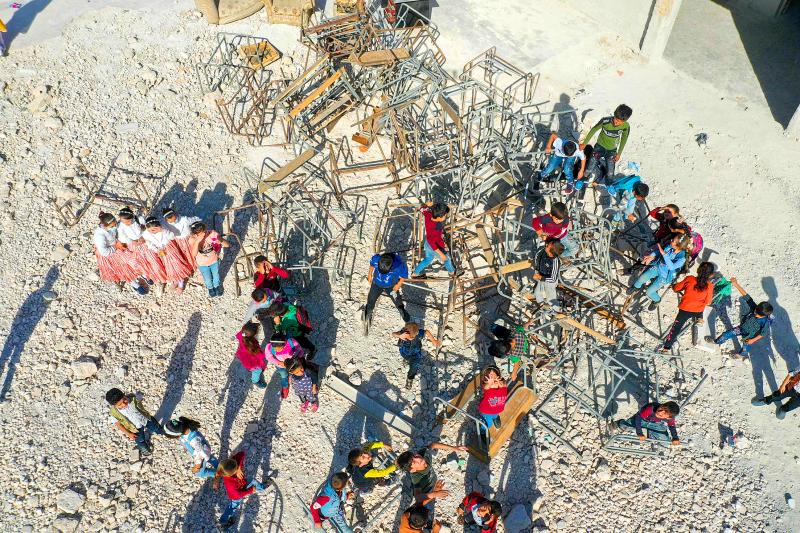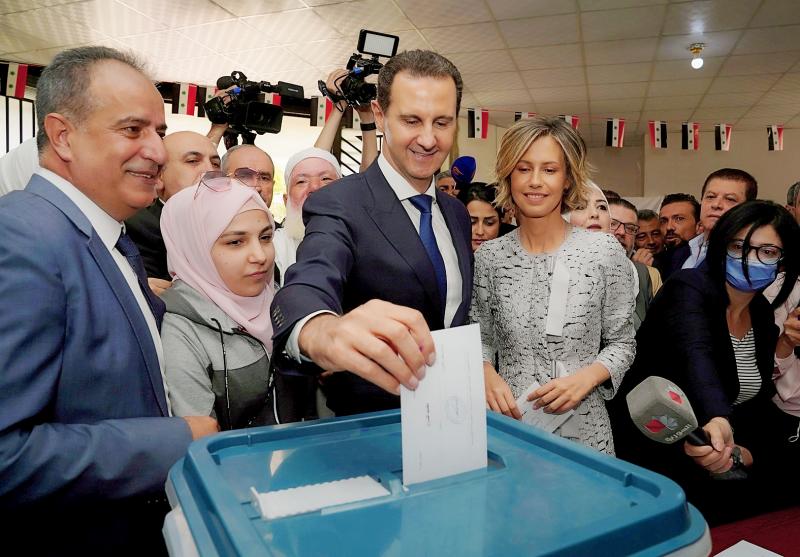While Syrian President Bashar al-Assad is still shunned by the West, who blame him for a decade of brutal war in Syria, a shift is under way in the Middle East, where Arab allies of the US are bringing him in from the cold by reviving economic and diplomatic ties.
The extension of al-Assad’s two-decade-old presidency in an election in May did little to break his pariah status among Western states, but fellow Arab leaders are coming to terms with the fact that he retains a solid grip on power.
The US’ chaotic withdrawal from Afghanistan has firmed up a belief among Arab leaders that they need to chart their own course.

Photo: AFP
Anticipating a more hands-off approach from Washington — which is preoccupied by the challenge of China — Arab leaders are driven by their own priorities, notably how to rehabilitate economies hammered by years of conflict and COVID-19.
Political considerations also loom large in Arab capitals such as Cairo, Amman and Abu Dhabi. These include their ties with al-Assad’s most powerful backer, Russia, which has been pressing for Syria’s reintegration, and how to counter the influence carved out in Syria by Iran and Turkey.
While the signs of Arab rapprochement with Damascus are growing — King Abdullah of Jordan spoke to al-Assad for the first time in a decade this month — US policy remains a complicating factor.

Photo: Reuters
Washington says that there has been no change in its policy toward Syria, which demands a political transition as set out in a UN Security Council resolution.
US sanctions targeting Damascus — which were tightened under former US president Donald Trump — still pose a serious obstacle to commerce.
However, in Washington, analysts say that Syria has hardly been a foreign policy priority for US President Joe Biden’s administration.
They say that Biden’s focus has been on countering China and that his administration has yet to apply sanctions under the so-called “Caesar Act,” which came into force last year with the intent of adding to the pressure on al-Assad.
After being warned against dealing with Damascus by the Trump administration, Arab states are pressing the issue again.
“US allies in the Arab world have been encouraging Washington to lift the siege on Damascus and allow for its reintegration into the Arab fold,” said David Lesch, a Syria expert at Trinity University in Texas. “It appears the Biden administration, to some degree, is listening.”
It marks a shift from the early years of the conflict when Syria was expelled from the Arab League and states including Saudi Arabia, Jordan and the United Arab Emirates, backed some of the rebels that fought al-Assad.
Jordan, Syria’s neighbor to the south, has been leading the pack on the Arab policy shift with an ailing economy and a rocky patch in relations with its wealthy Gulf neighbor Saudi Arabia.
The border between Syria and Jordan was fully reopened for trade last month, and Amman has been a driving force behind a deal to pipe Egyptian natural gas to Lebanon via Syria, with an apparent US nod of approval.
The crossing was once plied by hundreds of trucks a day moving goods between Europe, Turkey and the Gulf. Reviving trade will be a shot in the arm for Jordan and Syria, whose economy is in deep crisis. It should also help Lebanon, now suffering one of the sharpest economic depressions in modern history.
“I’m absolutely sure the Jordanians feel that the US will not sanction them,” said Jim Jeffrey, a former US special envoy for Syria under Trump.
“There’s a tremendous buzz among media, among friends in the region, that the US is no longer aggressively sanctioning al-Assad under the Caesar Act or other things.”

Kehinde Sanni spends his days smoothing out dents and repainting scratched bumpers in a modest autobody shop in Lagos. He has never left Nigeria, yet he speaks glowingly of Burkina Faso military leader Ibrahim Traore. “Nigeria needs someone like Ibrahim Traore of Burkina Faso. He is doing well for his country,” Sanni said. His admiration is shaped by a steady stream of viral videos, memes and social media posts — many misleading or outright false — portraying Traore as a fearless reformer who defied Western powers and reclaimed his country’s dignity. The Burkinabe strongman swept into power following a coup in September 2022

‘FRAGMENTING’: British politics have for a long time been dominated by the Labor Party and the Tories, but polls suggest that Reform now poses a significant challenge Hard-right upstarts Reform UK snatched a parliamentary seat from British Prime Minister Keir Starmer’s Labor Party yesterday in local elections that dealt a blow to the UK’s two establishment parties. Reform, led by anti-immigrant firebrand Nigel Farage, won the by-election in Runcorn and Helsby in northwest England by just six votes, as it picked up gains in other localities, including one mayoralty. The group’s strong showing continues momentum it built up at last year’s general election and appears to confirm a trend that the UK is entering an era of multi-party politics. “For the movement, for the party it’s a very, very big

ENTERTAINMENT: Rio officials have a history of organizing massive concerts on Copacabana Beach, with Madonna’s show drawing about 1.6 million fans last year Lady Gaga on Saturday night gave a free concert in front of 2 million fans who poured onto Copacabana Beach in Rio de Janeiro for the biggest show of her career. “Tonight, we’re making history... Thank you for making history with me,” Lady Gaga told a screaming crowd. The Mother Monster, as she is known, started the show at about 10:10pm local time with her 2011 song Bloody Mary. Cries of joy rose from the tightly packed fans who sang and danced shoulder-to-shoulder on the vast stretch of sand. Concert organizers said 2.1 million people attended the show. Lady Gaga

SUPPORT: The Australian prime minister promised to back Kyiv against Russia’s invasion, saying: ‘That’s my government’s position. It was yesterday. It still is’ Left-leaning Australian Prime Minister Anthony Albanese yesterday basked in his landslide election win, promising a “disciplined, orderly” government to confront cost-of-living pain and tariff turmoil. People clapped as the 62-year-old and his fiancee, Jodie Haydon, who visited his old inner Sydney haunt, Cafe Italia, surrounded by a crowd of jostling photographers and journalists. Albanese’s Labor Party is on course to win at least 83 seats in the 150-member parliament, partial results showed. Opposition leader Peter Dutton’s conservative Liberal-National coalition had just 38 seats, and other parties 12. Another 17 seats were still in doubt. “We will be a disciplined, orderly